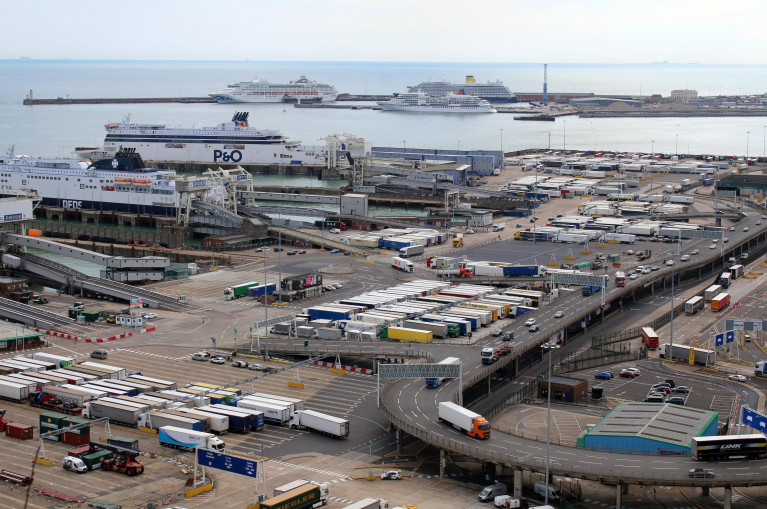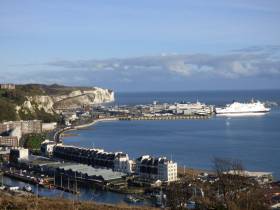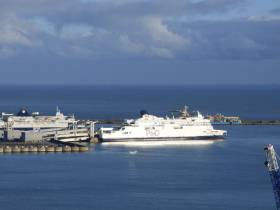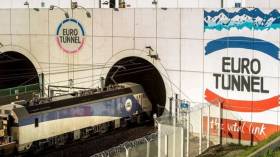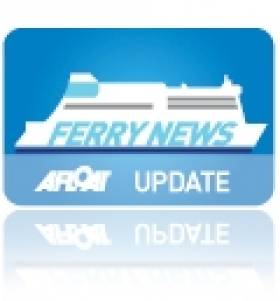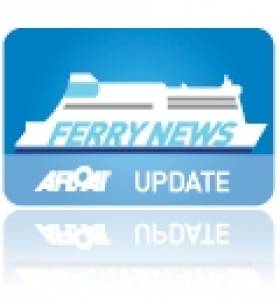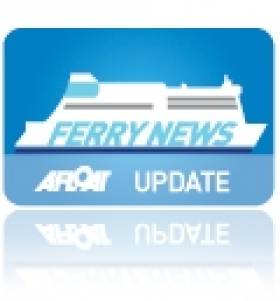Displaying items by tag: Eurotunnel
Eurotunnel Train Breaks Down And High Demand Leads to Delays With DFDS and Irish Ferries
The UK-France fixed link operator, Eurotunnel had delays to its services which have increased from three to four hours after a train broke down, reports KentOnline.
The disruption in Folkestone comes as lorries continue to queue on the M20 and A20 (the latter road, Afloat adds meets the A2, leading to the ferry port of Dover).
Eurostar services, as well as freight and passenger Eurotunnel services, were waiting for approximately three hours, but this afternoon, despite the broken down train having been moved, that increased to four.
Passengers – many likely to be holidaymakers on Easter breaks – were still being asked to check-in as planned. A spokesman said: "As a result of a technical issue with a freight shuttle overnight, Eurotunnel is currently operating a reduced service.
"We apologise to customers who may experience some delays during this incident and would like to assure everyone that we are working as fast as possible to remove the train from the tunnel and to restore normal service. We expect to have full services running again later in the day."
There are also problems for ferry passengers today, with delays of up to one and a half hours on DFDS Seaways and Irish Ferries between Dover and Calais due to high demand.
More from KentOline and for ferry updates, P&O Ferries twitter account said their Dover-Calais services today remain cancelled. This follows last month's dispute over crew also sacked from the operator's route network including on the Irish Sea.
Operator P&O Ferries is seeking almost £33m in damages from the UK government over its handling of a challenge to ferry contracts under a no-deal Brexit.
The British-based shipping company, BBC reports, also wants courts to cancel the Department for Transport's settlement with Eurotunnel, and impose civil penalties.
In March, the DfT agreed to pay £33m to Eurotunnel, after the cross-channel operator sued for not being considered for a no-deal Brexit freight contract.
The DfT said it acted appropriately.
"This cross-government decision helped protect vital freight capacity for medical supplies to enter the country, in the event the UK left the EU without a deal," a spokesperson said.
As part of the agreement with Eurotunnel, the French company was mandated to spend £33m of taxpayers' money on improvements to the infrastructure of its terminal in Folkestone.
To read more including 'Mininum Disruption' at UK borders click here.
#ferries- Operator P&O Ferries is suing the UK government over its £33m settlement with Eurotunnel, in the latest controversy over the Department for Transport’s (DfT) fraught no-deal Brexit preparations.
As writes The Guardian, the department was forced into the £33m payout after failing to include Eurotunnel in its agreements with ferry operators to provide emergency cross-Channel services, including the scrapped contract with Seaborne Freight. (Afloat adds see related Arklow Shipping story).
The DfT had signed deals worth £89m with Brittany Ferries and DFDS to secure routes for vital goods in the event of no deal, with forecasts of massive congestion on the routes to Dover and Calais where most freight traffic flows.
Now P&O is contesting the compensation awarded to Eurotunnel, claiming it leaves its ferry service facing an unfair disadvantage.
Further reading on the story can be read here.
UK Government Pays Eurotunnel £33m Over Brexit Ferry Case
#ferries - The UK government the BBC reports, will pay £33m to Eurotunnel in an agreement to settle a lawsuit over extra ferry services in the event of a no-deal Brexit.
In December, the Department for Transport (DfT) contracted three suppliers to provide additional freight capacity on ferries for lorries.
But Eurotunnel said the contracts were handed out in a "secretive" way.
As part of the agreement, Eurotunnel has agreed to make some improvements to its terminal.
One of the firms awarded a ferry contract, Seaborne Freight, has already had its deal cancelled after the backing of an Irish company (Arklow Shipping) pulled out.
Shortly after it was awarded the contract, the BBC found out that Seaborne had no ships and had never run a ferry service.
Transport Secretary Chris Grayling has been heavily criticised for the Seaborne deal, which would have been worth £13.8m.
In January, Eurotunnel wrote to Mr Grayling to complain that it had not been considered when the contracts were awarded.
It argued that unlike Seaborne, it has actually run a cross-Channel ferry service (MyFerryLink, which closed in 2015) and should have been approached.
For much more on the Eurotunnel settlement relative to the Brexit ferry fiasco, click here.
UK Competition Commission Bars Eurotunnel’s MyFerry
#MyFerry – The Dover-Calais operater MyFerry owned by Eurotunnel will be stopped from operating after the UK's Competition Commission (CC) decided that its acquisition of three ferries and other assets from the former ferry operator, SeaFrance, could mean higher prices for cross-Channel passengers and freight customers.
In its final report published yesterday, the CC has concluded that by adding ferry services to its existing Channel Tunnel business, Eurotunnel would increase its market share to over half and prices would rise. This confirms the CC's provisional findings which were published in February as previously reported on Afloat.ie
The CC found that Eurotunnel decided to acquire the SeaFrance ferries in order to prevent ferry operator DFDS/LD from buying them. Eurotunnel was concerned that if DFDS/LD obtained the assets cheaply, it could drive down prices for customers.
The CC also found that one of the three current ferry operators on the Dover–Calais route was likely to exit in the short term, if the CC took no action, in which case Eurotunnel could gain an even larger share of the cross-Channel market.
UK Competition Commission Question Eurotunnel Ferry Deal
#FerryCompetition – English Channel passengers and freight customers could face increased prices following Eurotunnel's acquisition of ferry operator, SeaFrance (Dover-Calais) the Competition Commission (CC) has provisionally found.
According to a summary of the CC's provisional findings published today, by adding ferry services to its existing Channel Tunnel business, Eurotunnel would significantly increase its already high share of the cross-Channel market and prices would rise.
The CC also found that Eurotunnel decided to acquire the SeaFrance ferries in order to prevent ferry operator DFDS/LD from buying them. Eurotunnel was concerned that if DFDS/LD obtained the assets cheaply, it could drive down prices for customers. For more on this story, from the UK's Competition Commission, click HERE.
P&O Ferries Protests Over Eurotunnel Bid to run French Ports
#StraitofDover– Dover's largest ferry operator P&O Ferries have written to the UK Office of Fair Trading, expressing concern over Eurotunnel's inclusion in a final round process to manage French shortsea ports Calais and Boulogne.
The Channel Tunnel operator's move could lead to 'substantial lessening of competition' in shortsea services between the UK and France.
Chief executive of P&O Ferries, Helen Deeble, said a successful bid by the Channel Tunnel operator could lead to a "substantial lessening of competition" in shortsea services between the UK and France.
Calais and Boulogne, owned by the Nord Pas de Calais Chamber of Commerce, comprise two of the three French shortsea ports serving ro-ro traffic out of the UK.
Ms Deeble, who is also the current president of the UK Chamber of Shipping, said a successful Eurotunnel bid would amount to a "relevant merger" within the Enterprise Act 2002, providing grounds for the OFT to investigate.
P&O Ferries, owned by Dubai World, further argues that the ports of Calais and Boulogne "would cease to be distinct from Eurotunnel" and that £70m ($109.8m) of UK derived turnover would be acquired by Eurotunnel.
As a result, said P&O Ferries: "More than 25% of France-based French sea port services for ex-UK ferry traffic is or will be provided by a single entity, Eurotunnel."
For much more on this story Lloyd's List has a report.


























